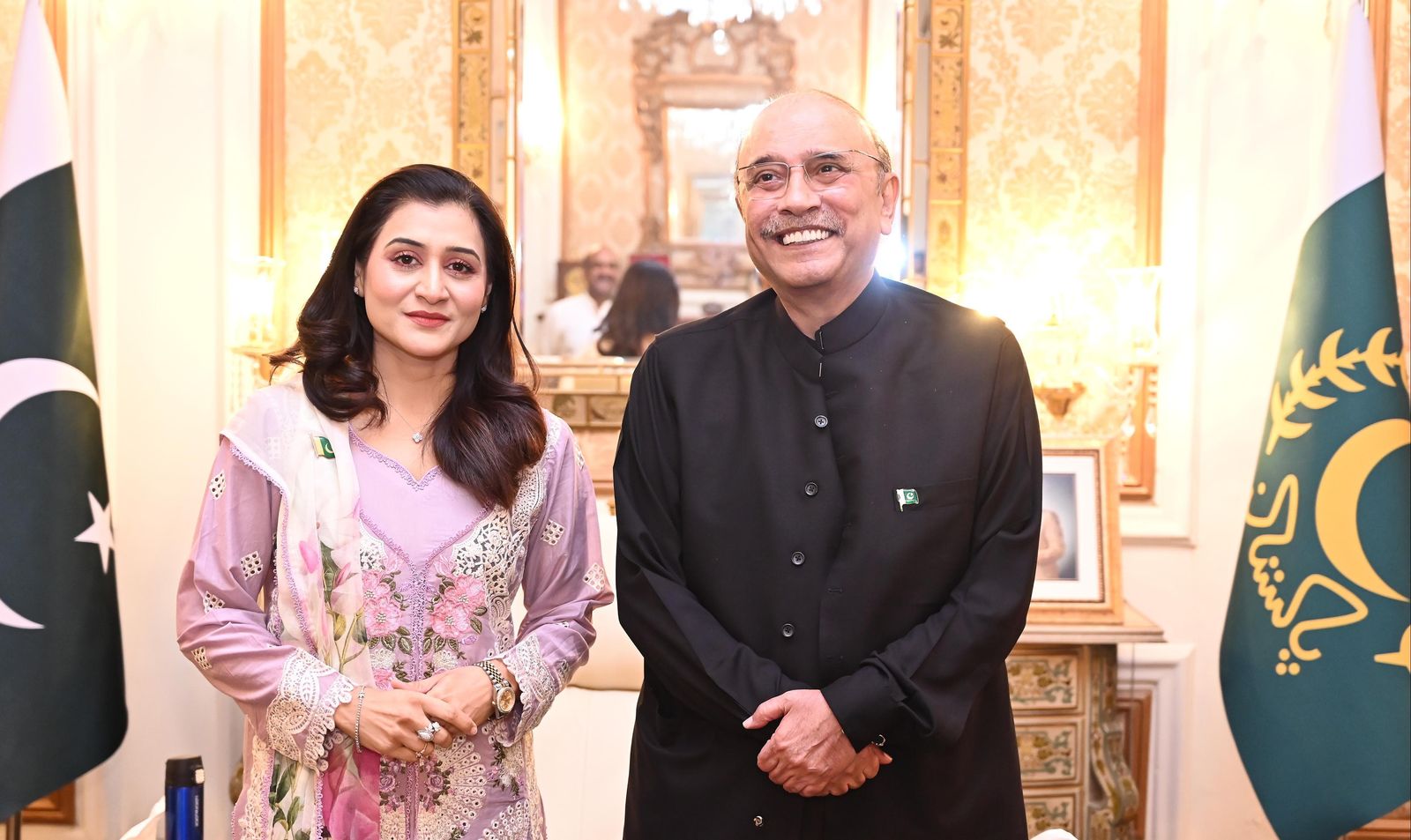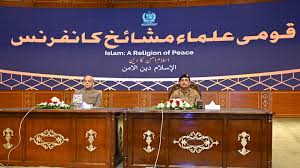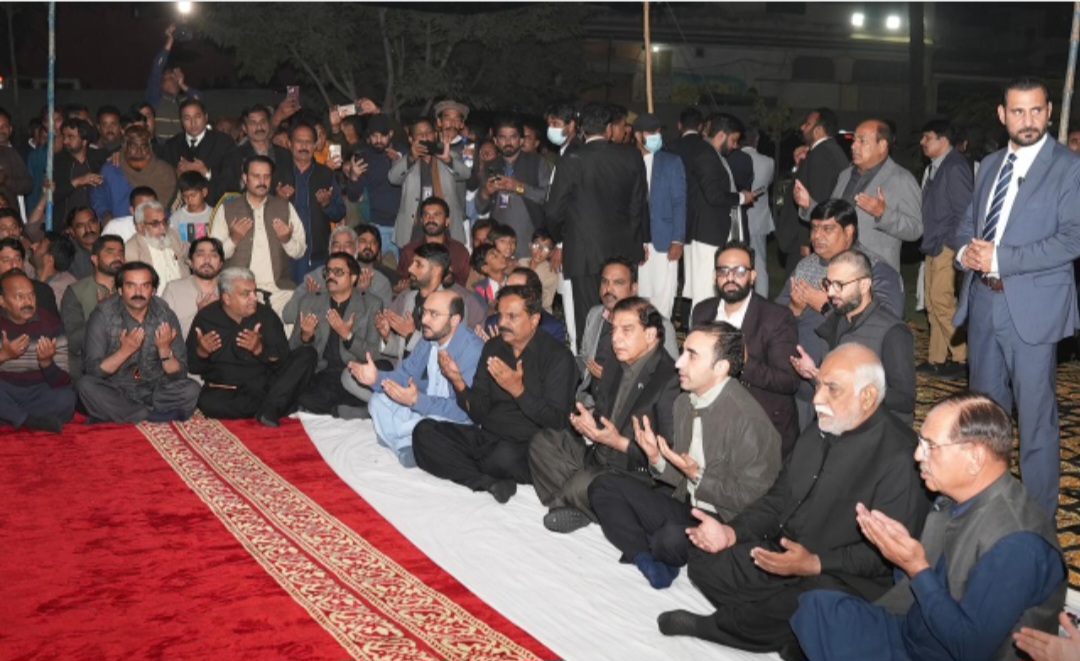Democracy’s Defender at 70: The Strategic Acumen of President Zardari
By Sania Kamran — Former Member, Punjab Assembly | Leader, Pakistan Peoples Party

A tribute to President Asif Ali Zardari on his 70th birthday, honoring his enduring legacy in strengthening Pakistan’s democracy and fostering national unity.
On 26th July 2025, Pakistan celebrates the 70th birthday of President Asif Ali Zardari, a politician whose life and rule have created a stunning tapestry in the political landscape of the country. Born in Karachi in 1955, President Zardari emerged from the flames of adversity to become a beacon of democratic resilience, earning accolades as the first civilian president in Pakistan's history to have been elected twice to this great honor, doing so most recently in March 2024. Today, as congratulatory wishes flood in from the Pakistan Peoples Party (PPP) leadership—Chairman Bilawal Bhutto Zardari, Bibi Bakhtawar Bhutto Zardari, First Lady Bibi Aseefa Bhutto Zardari, and Adi Faryal Talpur—party workers, and supporters, we salute a leader whose strategic flexibility and unshakeable devotion have reshaped Pakistan's democratic landscape.
President Zardari’s presidency, spanning 2008 to 2013 and resuming in 2024, stands as a testament to his belief that democracy is not merely a system but a living force that empowers the people. His philosophy, rooted in the vision of Quaid-e-Azam Muhammad Ali Jinnah and carried forward through the legacies of Shaheed Zulfikar Ali Bhutto and Shaheed Mohtarma Benazir Bhutto, has transformed Pakistan into a state where democratic institutions flourish. By voluntarily transferring presidential powers to the elected parliament through the landmark 18th Amendment, President Zardari has repositioned the balance of power with an irreversible swing so that democracy ceases to be a prized privilege and becomes a birthright.The repeal of Article 58(2)(b)—a provision that once allowed the dissolution of elected governments—marked a seismic shift, fortifying parliamentary sovereignty and provincial autonomy through the 19th and 20th Amendments.
His policy of reconciliation, a golden chapter in Pakistan’s 78-year history, countered conspiracies from undemocratic forces with a steadfast commitment to unity. President Zardari’s ability to navigate crises—economic, political, and social—without succumbing to vengeance or division has earned him recognition as a leader who rises above transient challenges. As supporters flood platforms like X with messages of admiration, hashtags such as #ZardariAt70 and #DemocracyChampion echo his enduring influence.
President Zardari’s first term exemplified effective governance. The restoration of the 1973 Constitution in its original parliamentary spirit, along with an independent judiciary, and an autonomous Election Commission created the environment for a democratic process to begin. Economically, his government was just as effective; foreign exchange reserves were $6 billion in 2008 and $16 billion by 2013 while exports were $18 billion and $29 billion. The stock exchange index rose from 5,220 to 18,185 points, while interest rates decreased from 17% to 9%. His government expanded financial assistance opportunities to 7.5 million households or 50 million people through the Benazir Income Support Programme (BISP) while introducing schemes aimed to improve the self-sufficiency for low-income families through capital knowledge via Waseela-e-Haq and Waseela-e-Rozgar.
Under the leadership of President Zardari during the period 2008 to 2013, the agricultural sector, or "the backbone of Pakistan's economy ", thrived. The Benazir Tractor Scheme along with fixed-cost electricity for tubewells transformed rural economies, increasing the value to agricultural sector from 50 billion rupees to 800 billion rupees within five years. Exports of wheat, a historic first, indicated that Pakistan had reached self-sufficiency in agriculture, in addition to record production of rice and cotton as policies placed a focus on the farmers. The NFC Award amplified resources available to provinces, and a 158% salary increase for all government employees was a clear intent of the government to improve the welfare of the public.
President Zardari's vision expanded beyond Pakistan's borders once again - he took the bold step of signing the Pakistan-Iran gas pipeline project and transferring control of the Gwadar Port, to China, both for energy security and regional connectivity. His addition of the CPEC arrangement raised the bar for development which would now place Pakistan squarely in the center for new economic opportunities. In addition to projects like expanding the Mangla and Tarbela Dams and the government's first renewable energy projects like Wind and Hydropower, a total of 3,600 MW were added to the national grid, with plans for 4,500 more MW through projects such as Diamer-Bhasha and Neelum-Jhelum.
President Zardari's legacy may be most indelibly etched, however, in his commitment to the socio-economic uplift of Pakistan's marginalized communities. Development was accelerated in Balochistan through the Aghaz-e-Haqooq-e-Balochistan Package, Gilgit-Baltistan was granted provincial status, and Khyber Pakhtunkhwa was renamed, rebuilding its cultural dignity. In the tribal areas, particularly in FATA, landmark reforms introduced basic rights for ordinary people and political representation for under-developed but political tribal groups, thus integrating FATA, for the first time, into the spheres of control of the Federation, melding these parts of formerly foreign territory into the geography of Pakistan. The hiring of 105,000 lady health workers, the re-instatement of thousands of left-behind and laid-off workers, and the regularization of Millions of contract workers, demonstrated a real commitment to including social inclusion in specific growth patterns. By giving 500,000 industrial workers 12% shares in 80 state-owned enterprises, and other further entrepreneurial incentives, Zardari also gave former laborers valuable equity. It was re-envisioning economic equity by formally manufacturing stakeholders out of workers!
Today, even President Zardari's adversaries acknowledge that he has become a visionary statesman. He has resisted the lure of propaganda and courageous populism. He has built on reconciliation, refused a descent into vindictive politics, and clearly marked his own space, not just as a events male leader; but a leader who will be remembered. The FPCCI Excellence Awards that Zardari endorsed celebrate the spirit of the business community's role in driving exports and innovation, while his call for investment in the stock market highlights a long-term vision for economic transformation.
As Pakistan marks President Zardari's 70th birthday, it is necessary to pay tribute to a leader who weathered the storms of politics with grace, wisdom, and the determination of a true democrat. He leaves behind a major legacy of political milestones, from constitutional reforms to a resurgent economy built on the pillars of a stronger and more inclusive Pakistan. In the words of Mohtarma Benazir Bhutto, "Democracy is the best revenge." President Zardari has acted on this principle, demonstrating that real leadership means building bridges, empowering the powerless, and making a legacy that will be a source of inspiration for decades yet to come.



No comments yet.